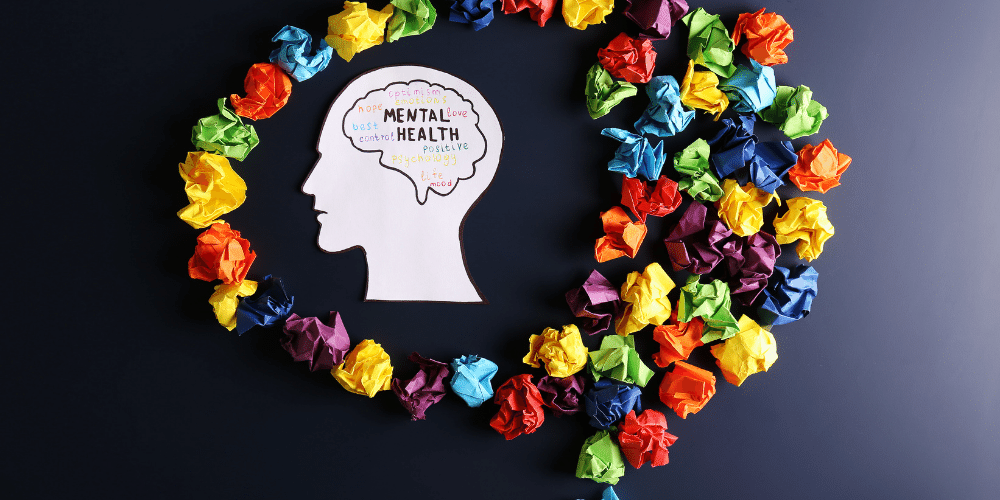What is the difference between mental and emotional health?It’s common to hear people use the terms “mental health” and “emotional health” interchangeably. While it’s true that both mental and emotional health are important parts of our overall well-being, there are some key differences between the two. Mental health refers to our cognitive well-being— how we think, feel, and behave. It encompasses our ability to manage our thoughts, emotions, and behaviors in positive ways to cope with stress and challenges. Emotional health, on the other hand, refers to our ability to regulate our emotions. This includes our ability to express our emotions in appropriate ways, as well as our ability to manage difficult emotions like sadness, anger, and anxiety. In this blog post, we will explore the differences between mental and emotional health in more detail. We will also discuss some tips for maintaining good mental and emotional health.
Mental health vs. emotional health
Mental health and emotional health are often used interchangeably, but there is a big difference between the two. Mental health refers to your overall well-being, including your ability to cope with stress and make healthy choices. Emotional health, on the other hand, is all about your ability to regulate your emotions.
While both mental and emotional health are important for your overall well-being, they play different roles in your life. Mental health is more about your overall wellbeing, while emotional health is more about how you manage and cope with your emotions.
It’s important to have a balance of both mental and emotional health in order to live a happy and healthy life.

The different types of mental health disorders
Mental health disorders come in many different shapes and sizes. Some of the more common types include:
Anxiety Disorders: Anxiety disorders are characterized by feelings of unease, worry, and fear. These can be debilitating and interfere with daily life.
Depressive Disorders: Depressive disorders are characterized by persistent feelings of sadness, worthlessness, and hopelessness. These can also be debilitating and interfere with daily life.
Bipolar Disorder: Bipolar disorder is characterized by periods of extreme highs (mania) and lows (depression). This can be a very difficult disorder to manage.
Obsessive-Compulsive Disorder: Obsessive-compulsive disorder is characterized by persistent intrusive thoughts (obsessions) and/or repetitive behaviors (compulsions). This can be a very frustrating disorder to deal with.
Post-Traumatic Stress Disorder: Post-traumatic stress disorder is characterized by flashbacks, nightmares, anxiety, and avoidance behavior related to a traumatic event. This can be a very difficult disorder to overcome.
The different types of emotional health disorders
There are a variety of different emotional health disorders that can impact an individual’s life. These disorders can range from mild to severe, and can be temporary or chronic. Some common emotional health disorders include anxiety, depression, bipolar disorder, and post-traumatic stress disorder (PTSD).
Anxiety is a feeling of unease, worry, or fear. It can be mild or severe, and can be triggered by a specific event or situation, or it may be ongoing. Anxiety can cause physical symptoms such as a racing heart, sweating, and difficulty breathing. It can also impact an individual’s ability to concentrate or sleep.
Depression is more than just feeling sad or down. It is a persistent low mood that can interfere with an individual’s ability to work, study, eat, and sleep. Depression can also cause physical symptoms such as fatigue, aches and pains, and headaches.
Bipolar disorder is a mental illness that causes extreme changes in mood. Individuals with bipolar disorder may experience periods of mania (highs) followed by periods of depression (lows). Bipolar disorder can be very disruptive to an individual’s life and can sometimes lead to suicidal thoughts or attempts.
PTSD is a type of anxiety disorder that can develop after someone has experienced or witnessed a traumatic event such as a natural disaster, serious accident, terrorist attack, war/combat, rape, or child abuse. PTSD can cause flashbacks, nightmares, and intrusive thoughts. It can also lead to avoidance behaviours such as avoiding people, places, or things that remind the individual of the trauma.
How to know if you have a mental or emotional health disorder
There is a big distinction between having a mental health disorder and simply experiencing an emotional health disorder. The former is characterized by long-term, chronic symptoms that significantly interfere with everyday functioning, while the latter is typified by more temporary reactions to stressful life events. Here are some key ways to tell the two apart:
If you have a mental health disorder, you will likely experience:
Persistent feelings of sadness, anxiety, or emptiness
Loss of interest in activities you once enjoyed
Problems sleeping or concentration difficulties
Extreme mood swings
Irritability or rage
Feelings of worthlessness or guilt
Recurring thoughts of death or suicide
These symptoms must be present for at least two weeks for a diagnosis to be made. If you are struggling with any of the above but don’t feel like they are impacting your life in a negative way, then you may just be experiencing an emotional health disorder. These can include:
Treatment options for mental and emotional health disorders
Mental and emotional health disorders can be treated in a variety of ways. Depending on the disorder, treatment may include medication, therapy, or a combination of both.
Medication can be an effective treatment for mental and emotional disorders. In some cases, medication can help to stabilize moods and alleviate symptoms. Medication is often used in conjunction with therapy to provide the best possible outcome.
Therapy can also be an effective treatment for mental and emotional disorders. Therapy can help people learn how to cope with their disorder and work through their emotions. Therapy is often used in conjunction with medication to provide the best possible outcome.
What is mental health?
Mental health is an important part of overall health and well-being. It includes our emotional, psychological, and social well-being. It affects how we think, feel, and act. It also helps determine how we handle stress, relate to others, and make choices.
Good mental health is not just the absence of mental illness. It is also about having a positive outlook on life, being able to cope with life’s challenges, and feeling good about yourself. Everyone experiences ups and downs in their moods. But if you are struggling more than usual or for a long time, you may have a mental health problem.
There are many types of mental health problems. They range from mild to severe and can affect anyone at any age. Some common types include:
Anxiety disorders
Depression
Bipolar disorder
Eating disorders
Obsessive-compulsive disorder (OCD)
Posttraumatic stress disorder (PTSD)
Schizophrenia
seeking help from a mental health professional can be very beneficial.
What is emotional health?
When it comes to emotional health, there are a few key things to keep in mind. First, emotional health is about more than just feeling happy all the time. It’s about being able to cope with life’s ups and downs in a healthy way. Secondly, everyone has different emotional needs and what works for one person might not work for another.
That said, there are some general tips that can help improve your emotional health. For example, staying connected to loved ones, getting regular exercise, and eating a healthy diet can all help boost your mood and keep your emotions in check. Additionally, making time for activities that make you feel good – whether that’s reading, listening to music, or spending time outdoors – can also help you stay emotionally healthy.
The difference between mental and emotional health
Mental and emotional health are two important aspects of our overall health. They are interconnected and affect our physical, social, and spiritual wellbeing.
Mental health refers to our cognitive, psychological, and emotional wellbeing. It is how we think, feel, and behave. Mental health includes our ability to cope with stress, manage our emotions, and make positive choices in our lives.
Emotional health is about our ability to express our emotions in a healthy way. It includes having positive relationships, managing stress effectively, and having a positive outlook on life. Emotional health is essential for our overall wellbeing.
The difference between mental and emotional health is that mental health refers to our cognitive, psychological, and emotional wellbeing while emotional health focuses on our ability to express our emotions in a healthy way. Both are important for our overall health.

How to maintain good mental and emotional health
It is important to maintain good mental and emotional health in order to live a happy and fulfilling life. There are a few key things you can do to make sure you are taking care of yourself both mentally and emotionally.
First, it is important to be aware of your thoughts and feelings. If you notice that you are feeling down or anxious, it is important to take a step back and assess the situation. Once you have identified how you are feeling, you can then begin to address the issue. This may involve talking to someone about your feelings, journaling, or engaging in self-care activities.
Second, it is essential to manage stress in a healthy way. Stress can have a negative impact on both your mental and emotional health if it is not managed properly. There are a variety of ways to manage stress, such as exercise, relaxation techniques, and positive thinking. Find what works best for you and make sure to stick with it.
Lastly, it is important to build positive relationships with those around you. Surround yourself with people who make you feel good about yourself and who support your goals and values. These positive relationships will help improve your mental and emotional health overall.
How to maintain mental and emotional health
Mental and emotional health are both important aspects of our overall wellbeing. Here are some tips on how to maintain mental and emotional health:
-Find ways to relax and reduce stress. This could include practices like yoga, meditation, or spending time in nature.
-Eat a healthy diet and exercise regularly. Both of these help to boost our mood and energy levels.
-Make time for activities that make you happy. This could be anything from reading, listening to music, or spending time with friends and family.
-Talk about your feelings. It’s important to express what we’re feeling, whether it’s good or bad. Talking to a therapist or counselor can be helpful in managing difficult emotions.
When to seek help for mental or emotional health problems
Mental and emotional health problems can manifest in many different ways, so it can be difficult to know when to seek help. If you are experiencing any of the following symptoms, it may be time to reach out to a mental health professional:
-Persistent feelings of sadness, anxiety, or emptiness
-Loss of interest in activities that used to bring joy
-Withdrawing from social activities and isolating yourself from loved ones
-Changes in appetite or sleep patterns
-Difficulty concentrating or making decisions
-Extreme mood swings
-Feelings of hopelessness or worthlessness
– thoughts of death or suicide
Conclusion
There is often confusion between mental and emotional health. They are both important aspects of our overall health, but they are not the same thing. Mental health refers to our cognitive and psychological well-being, while emotional health is more about our feelings and emotions. Both are important for a balanced and healthy life.










Leave a Reply